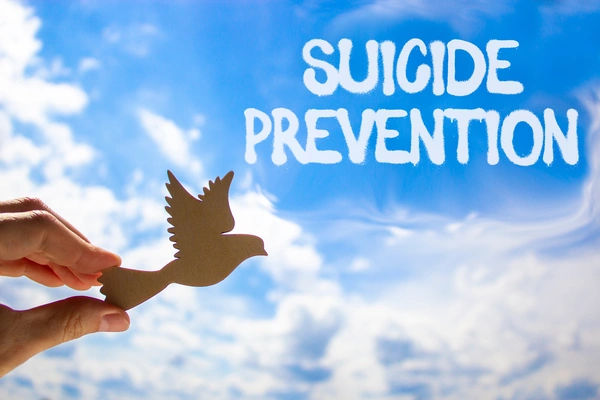A Compassionate Guide to Prevent Suicidal Attempts: Let's Talk Openly
Learn how to recognise suicidal warning signs, start compassionate conversations, create safety plans, and support long-term recovery with this practical guide.

Written by Dr. Dhankecha Mayank Dineshbhai
Reviewed by Dr. Md Yusuf Shareef MBBS
Last updated on 13th Jan, 2026

Introduction
The thought of a loved one, or even ourselves, experiencing such profound pain that suicide feels like the only option is terrifying. It’s a difficult topic, but silence can be deadly. Talking openly, compassionately, and knowledgeably is the first and most powerful step to prevent suicidal attempts. This guide is designed to demystify the process, equip you with practical tools, and remind you that you are not alone in this. We will explore how to recognise the warning signs, initiate a caring conversation, take immediate action, and foster long-term resilience. Remember, suicide prevention is a community effort, and your awareness can save a life.
Understanding the Urge: It's More Than Just Sadness
Suicidal thoughts often stem from an overwhelming sense of hopelessness and psychological pain, where a person can’t see any other way to end their suffering. It’s not simply a matter of being "very sad." It's a health crisis related to conditions like major depression, anxiety disorders, PTSD, or other factors that impair judgement and cloud perspective. Understanding this helps us approach the situation with empathy rather than blame.
Key Risk Factors for Suicidal Thoughts
Certain factors can increase someone's vulnerability. These include:
Mental Health Conditions: Depression, bipolar disorder, schizophrenia, and substance use disorders are significant risk factors.
Previous Attempts: A history of prior suicide attempts is one of the strongest predictors.
Chronic Pain or Illness: Dealing with unrelenting physical pain or a terminal diagnosis can lead to despair.
Traumatic Experiences: This includes abuse, loss, and prolonged stress.
Social Isolation: Lack of a strong support system, loneliness, and family conflict.
Distinguishing Between Suicidal Ideation and an Imminent Plan
It's crucial to understand the difference. Suicidal ideation refers to thinking about or preoccupation with suicide. An imminent plan involves having a specific method, time, or means in mind. Both are serious and require attention, but the latter constitutes a medical emergency. If you suspect someone has a plan, do not leave them alone and seek help immediately.
Recognising the Warning Signs: What to Look For
Being able to identify the warning signs of suicidal behaviour is critical. These signs can be verbal, emotional, or behavioural.
Consult a Psychologist for the best advice
Verbal and Emotional Cues
Listen for statements like:
- "I can't take it anymore."
- "Everyone would be better off without me."
- "I feel trapped."
- Talking about being a burden or having no reason to live.
Emotionally, you might notice unrelenting hopelessness, rage, increased anxiety, or dramatic mood swings.
Behavioural Changes and Actions
Actions often speak louder than words. Be alert to:
- Withdrawing from friends, family, and social activities.
- Giving away prized possessions or making final arrangements.
- Increased use of alcohol or drugs.
- Researching ways to die online.
- Extreme changes in sleep patterns—sleeping too much or too little.
How to Talk to Someone You're Worried About: A Step-by-Step Guide
If you notice these signs, it's time to talk. Your goal is not to be a therapist, but a compassionate human being who cares.
Starting the Conversation with Compassion
Find a private, quiet moment. Be direct but gentle. You could say, "I've noticed you've seemed really down lately, and I'm worried about you. I care about you, and I'm here to listen." Using "I" statements reduces defensiveness.
What to Say (and What to Avoid)
- DO: Ask directly, "Are you thinking about suicide?" This does not put the idea in their head; it shows you are open to discussing the hard stuff.
- DO: Listen actively. Let them speak without interruption.
- AVOID: Dismissive phrases like "You have so much to live for!" or "This is just a phase." This invalidates their pain.
- AVOID: Promising secrecy. You cannot keep a plan for suicide a secret.
Listening Without Judgement
The most powerful tool you have is supportive listening. Nod, maintain eye contact, and offer validating phrases like, "That sounds incredibly difficult," or "Thank you for trusting me with this." Your calm presence can be a lifeline.
Immediate Action Steps: Creating a Safety Plan
If someone confirms they are having suicidal thoughts, it's time to act.
How to Develop a Suicide Safety Plan
A safety plan is a structured set of steps a person agrees to follow when they feel a crisis coming on. It includes:
- Recognising personal warning signs.
- Internal coping strategies (e.g., breathing exercises).
- People to contact for distraction.
- People to contact for direct support.
- Contact information for professionals (therapists, crisis text line).
- Making the environment safe (e.g., removing means).
When to Seek Emergency Help
If the person has a plan, the means to carry it out, and intent to do so immediately, this is a life-threatening emergency. Do not leave them alone.
- Call 999 or your local emergency number.
- Take them to the nearest emergency room.
- Contact a crisis hotline like the 988 Suicide & Crisis Lifeline (call or text 988) for guidance.
For ongoing support, consulting a mental health professional is essential. If you or a loved one are struggling with persistent suicidal thoughts, consult a psychiatrist or therapist online with
Apollo24|7 for further evaluation and a long-term treatment plan.
Long-Term Prevention Strategies: Building Resilience
Prevention doesn't end with the crisis. Long-term healing involves building strength from the inside out.
The Role of Professional Therapy and Counselling
Therapy (like Cognitive Behavioural Therapy or CBT) is highly effective. It helps individuals reframe negative thought patterns and develop healthy coping strategies for severe depression. A professional can provide a diagnosis and tailored treatment, which may include medication.
Building a Strong Support Network
Encourage connection with supportive friends, family, or support groups. Reducing isolation is a powerful buffer against suicidal thoughts.
Lifestyle Factors: Sleep, Diet, and Exercise
Basic self-care has a profound impact on mental health. Regular sleep patterns, a nutritious diet, and physical activity can significantly improve mood and reduce anxiety symptoms. In some cases, a doctor might recommend tests to rule out underlying physiological issues; Apollo24|7 offers convenient home collection for tests like thyroid panels or vitamin levels that can impact mental well-being.
How to Support a Loved One After a Suicidal Crisis
Recovery is a journey that requires ongoing support.
Fostering a Supportive Home Environment
Check in regularly without being intrusive. Help with practical tasks to reduce their stress. Most importantly, continue to include them in life and treat them with normalcy and respect.
Taking Care of Your Own Mental Health as a Supporter
Supporting someone in crisis is emotionally taxing. It's vital to set boundaries and seek your own support system or therapy to avoid burnout.
Conclusion
Preventing suicidal attempts is a multifaceted mission rooted in courage, connection, and compassion. It begins with breaking the silence and continues with educated, empathetic action. By learning to recognise the signs, initiating caring conversations, and knowing how to access immediate and long-term help, every one of us can play a part in saving a life. Remember, suicidal thoughts are often temporary, even if they don't feel that way in the moment. With the right support and intervention, recovery is absolutely possible. If you take only one thing from this guide, let it be this: your willingness to see, to ask, and to listen can be the light that guides someone back from the brink. Let's keep talking about it.
Consult a Psychologist for the best advice
Consult a Psychologist for the best advice

Mr. Aman Kochhar
Psychologist
2 Years • MA - Psychology, Post Graduate Diploma In Guidance and Counselling
New Delhi
Well-mind Counselling, New Delhi

Ms Rajashree Navthale
Psychotherapy & Counselling (ASM)
8 Years • MA in Counselling & Psychotherapy, PG Diploma in Counselling & Psychotherapy.
Akola
Connect Counselor, Akola

Dr. M Shyamala Devi
Psychologist
33 Years • DCH, MRCP, MRCH
Chennai
Apollo Children Hospitals Greams Road, Chennai

Ms. Moumita Ganguly
Psychologist
13 Years • B.ED(Special) Visual Impairment , PG.Diploma in Rehabilitation psychology
Kolkata
M’s Clinic, Kolkata
(150+ Patients)

Ms. Sapna Zarwal
Psychologist
20 Years • Msc (Applied Psychology), Ph D ( Special Education)
Gurugram
SOOTHING ZEN, Gurugram
(25+ Patients)
Consult a Psychologist for the best advice

Mr. Aman Kochhar
Psychologist
2 Years • MA - Psychology, Post Graduate Diploma In Guidance and Counselling
New Delhi
Well-mind Counselling, New Delhi

Ms Rajashree Navthale
Psychotherapy & Counselling (ASM)
8 Years • MA in Counselling & Psychotherapy, PG Diploma in Counselling & Psychotherapy.
Akola
Connect Counselor, Akola

Dr. M Shyamala Devi
Psychologist
33 Years • DCH, MRCP, MRCH
Chennai
Apollo Children Hospitals Greams Road, Chennai

Ms. Moumita Ganguly
Psychologist
13 Years • B.ED(Special) Visual Impairment , PG.Diploma in Rehabilitation psychology
Kolkata
M’s Clinic, Kolkata
(150+ Patients)

Ms. Sapna Zarwal
Psychologist
20 Years • Msc (Applied Psychology), Ph D ( Special Education)
Gurugram
SOOTHING ZEN, Gurugram
(25+ Patients)
More articles from Suicide and suicidal thoughts
Frequently Asked Questions
What should I do if I'm having suicidal thoughts myself?
Tell someone immediately. This could be a trusted friend, family member, or a professional. You are not a burden. Call or text the 988 Suicide & Crisis Lifeline (988) anytime—they are there to listen and help. Your life is precious.
If I ask someone if they're suicidal, will I be putting the idea in their head?
No. Extensive research shows that asking someone directly about suicide does not increase their risk. In fact, it often provides immense relief, as it allows them to share their pain openly with someone who cares.
What's the difference between the 988 Lifeline and calling 999?
988 is a national mental health crisis hotline staffed by trained counsellors. It's the best first step for someone who is in distress but not in immediate, life-threatening danger. Call 999 if the person has a specific plan and is in imminent danger of harming themselves.
How can I make my home safer for someone experiencing suicidal thoughts?
This is a key part of a safety plan. Securely store or remove potential means, such as firearms, medications, sharp objects, and even ropes. This 'means restriction' is a proven method to prevent suicidal attempts during a crisis.
Is it normal to feel angry or frustrated with a loved one who is suicidal?
Yes, it can be. These feelings are a normal part of the complex emotions caregivers experience. It's crucial to acknowledge these feelings without guilt and to find a healthy outlet for them, such as talking to a therapist or a support group for caregivers.



